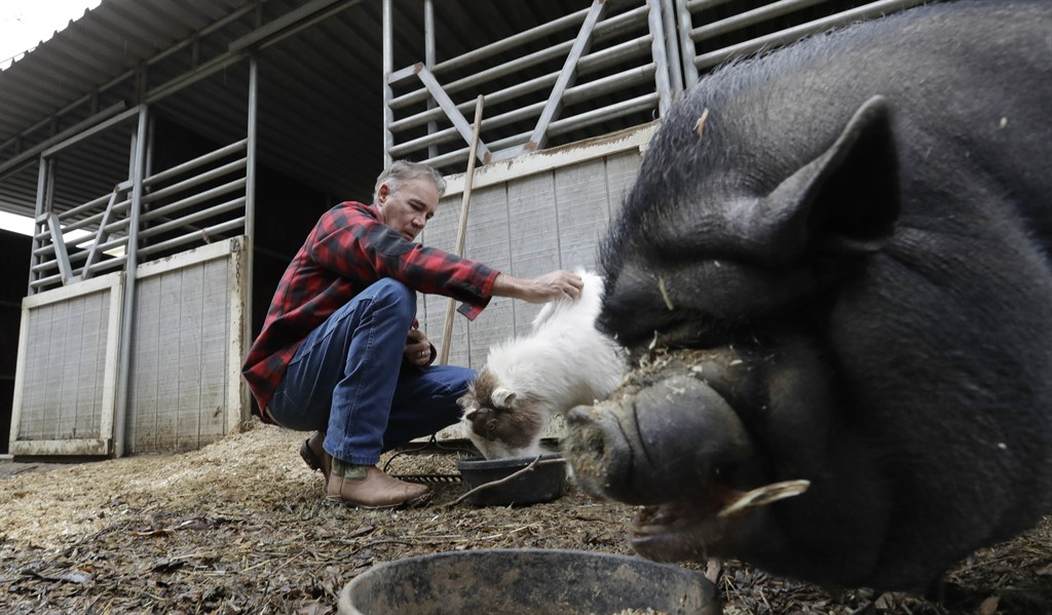Why are foreign-owned conglomerates trying to interfere with Americans’ food supply? You might be surprised to learn that some of these corporations are attempting to invalidate a key food safety measure passed overwhelmingly by voters. In 2018, Californians took a stand against food they deemed unsafe and cruel in their marketplace by enacting Proposition 12. This law says that pork from an animal “confined in a cruel manner” cannot be sold in the state (similar to the standards already in place for hens in the egg industry).
Leading food safety experts supported these restrictions because bacteria and viruses are more likely to grow, spread, and mutate in facilities that cram animals into tiny cages. But rather than adhering to the law, some in the pork industry, including massive conglomerates like trade groups representing Chinese-owned Smithfield or Brazilian-owned JBS, are fighting to have Proposition 12 struck down by the United States Supreme Court. I wrote about this elsewhere last week because as an old 4-H’er and ranch-dwelling kid, this stuff matters to me, and I happen to be lucky enough to have a megaphone.
Here’s what’s bugging me: At some industrial pork operations, pregnant pigs are confined in tiny cages that are virtually no bigger than the pigs’ own bodies. These metal cages — in which the pigs are forced to eat, sleep, and defecate, all in the same space — are lined up next to each other and resemble a parking lot jammed full of parked cars. Lawyers from companies like Smithfield have defended this practice. Meanwhile, American multigenerational family farmers have asserted that Proposition 12 “provid[es] important new production and marketing opportunities to family farmers.”
Lining pigs up in tiny cages and prohibiting them from engaging in most of the behaviors that are natural to them is inhumane. Conservative Christians are speaking out against this cruel treatment and defending the rights of Californians to prohibit pork from confined animals in their market. Notre Dame Law Professor O. Carter Snead, author Mary Eberstadt, and former George W. Bush speechwriter Matthew Scully (author of one the greatest, most thoughtful books I have ever read on the subject of animal welfare) filed an amicus brief in the Supreme Court, in which they outlined our ethical duty to animals.
Snead, Eberstadt, and Scully write, “It is precisely because animals are vulnerable at the hands of humans that humans are morally bound to treat them decently and honorably.” They also explain that while Proposition 12’s standards may be a modern idea, the law “reflects concerns of ancient lineage in Western moral thought.” They conclude that Proposition 12 should be upheld because “[j]ust as human beings in the Western tradition are required to moderate other natural appetites that can lead to harmful and unjust conduct, so too must humans moderate their appetite for products generated through the exploitation of vulnerable animals.”
Intensively confining pigs is also filthy and creates serious hazards for public health. Ensuring a safe food supply in the United States is a critically important issue, especially for parents who are deciding what to feed their children. We should be encouraging policies that promote standards to rid marketplaces of unsafe products, including potential threats from national security foes. Proposition 12 is one of those policies.
The American Public Health Association, the Infectious Diseases Society of America, and other public health organizations and infectious disease experts document why extreme confinement in the pork industry is dangerous to human health. They note that in 2020, there were 787,000 incidences of “foodborne illnesses in the U.S. attributable to pork consumption.” Intensive confinement has been documented with scientific evidence to cause extreme stress in pregnant pigs, suppressing their immune systems. Piglets born to confined pregnant pigs also have suppressed immune systems, making them more vulnerable to disease. As the public health experts explain, “Once infected, the piglets often do not show symptoms of illness, and thus become undetected vectors of disease as they are transported to various stages of the pork production process and, ultimately, to slaughter.” Pork from these sick pigs can then enter our food supply, ending up in places like school lunches.
Related: Brace Yourself: Food Shortages Will Be a Reality in the West This Winter
I applaud California voters for taking steps to keep diseased pork from abused animals out of the state market. When it comes to feeding our kids and families safe food, the answer to the question of who to trust is clear. Foreign-owned conglomerates from countries with notorious food safety controversies, where kids have been sickened and killed by lack of concern, will try to sway the Supreme Court. But the justices should listen to sound food safety science and American family farmers who are supportive of laws like Proposition 12.










Join the conversation as a VIP Member